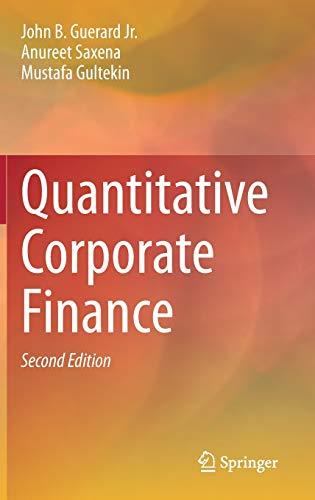Question
Question 1 Consider two risky assets A and B with E(rA)= 15%, Sigma_A= 32%, E(rB)= 0.09, Sigma_B= 23%, corrA,B= 0.2. The risk free rate is
Question 1
Consider two risky assets A and B with E(rA)= 15%, Sigma_A= 32%, E(rB)= 0.09, Sigma_B= 23%, corrA,B= 0.2. The risk free rate is 5%. The optimal risky portfolio of comprised of the two risky assets is to allocate 64% to A and the rest to B. What is the standard deviation of the optimal risky portfolio ?
Select one:
a. 20.75%
b. 23.61%
c. 22.86%
d. 23.00%
Question 2
Continued with previous question. What is the Sharpe ratio of the optimal risky portfolio?
Select one:
a. 0.33
b. 0.35
c. 0.31
d. 0.29
Question 3
Continue to use the information given in previous two questions.
If your target expected return is 12%, lower than the expected return of the optimal risky portfolio, which is comprised of 64% risky asset A and 36% risky asset B, which of the following statements is not correct?
Select one:
a. invest 89.16% of your capital in this optimal risky portfolio and the rest in the risk-free asset
b. The asset allocation is 57.06% in A, 32.10% in B and 10.84% in the risk-free.
c. The sigma of your complete portfolio is 21%
d. not invest in the optimal risky portfolio but choose another portfolio on the investment opportunity set that has expected return of 12%.
Question 4
Continue to use the information from previous questions.
If you only invest in the two risky assets A and B, not the risk-free asset and your target expected return is still 12%, what should be the portfolio composition ?
Select one:
a. 50% in A and 50% in B
b. 60% in A and 40% in B
c. 64% in A and 36% in B
d. 65% in A and 35% in B
Question 5
Compare the previous two portfolios with the same expected return of 12%, one with investment in the risk-free asset and another one without investment in the risk-free asset. Which of the following statements is NOT correct?
Select one:
a. The portfolio without investment in the risk-free asset situates to the left of the optimal risky portfolio on the same capital allocation line.
b. The portfolio without investment in the risk-free asset sits on the investment opportunity set comprised of the two risky assets A and B.
c. The portfolio without investment in the risk-free asset has higher standard deviation than the portfolio with investment in the risk-free asset.
d. The portfolio without investment in the risk-free asset locates below the optimal capital allocation line.
Step by Step Solution
There are 3 Steps involved in it
Step: 1

Get Instant Access to Expert-Tailored Solutions
See step-by-step solutions with expert insights and AI powered tools for academic success
Step: 2

Step: 3

Ace Your Homework with AI
Get the answers you need in no time with our AI-driven, step-by-step assistance
Get Started


